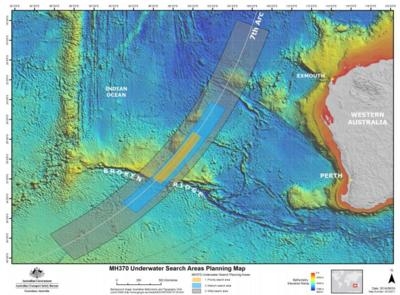Sat, Jun 28, 2014
Information Included On Update On Search Area
In a report released Thursday by the Australian Transport Safety Bureau, the agency says that the most likely scenario for the end of Malaysia Airlines Flight 370 was that all on board succumbed to hypoxia, and that the Boeing 777 traveled on autopilot until its fuel was exhausted and it went down in the Indian Ocean.

In a section titled "End of Flight Scenario", the Bureau writes that "there were multiple redundant communications systems fitted to the aircraft (3 x VHF radios, 2 x HF radios, SATCOM system, 2 x ATC transponders). However, no radio communications were received from the aircraft after 1719.29, 7 hours prior to the last SATCOM handshake at 00:19. Analysis of the SATCOM data also showed that there were probably no large changes to the aircraft’s track after approximately 1915, about 5 hours prior to the last SATCOM handshake.
"Given these observations, the final stages of the unresponsive crew/ hypoxia event type appeared to best fit the available evidence for the final period of MH370’s flight when it was heading in a generally southerly direction:
- loss of radio communications
- long period without any en route manoeuvring of the aircraft
- a steadily maintained cruise altitude
- fuel exhaustion and descent
"This suggested that, for MH370, it was possible that after a long period of flight under autopilot control, fuel exhaustion would occur followed by a loss of control without any control inputs."
The ATSB stresses that this suggestion is made for the sole purpose of assisting to define a search area. The determination of the actual factors involved in the loss of MH370 are the responsibility of the accident investigation authority and not the Search Strategy Working Group (SSWG).
The ATSB said that the next phase of the search will concentrate on an area consisting of about 23,000 square miles extending along an arc for 400 miles in a northeast direction from Broken Ridge. The width of the priority search area is 58 miles. The search is expected to resume in August.
(ATSB Graphic)
More News
Outboard Section Of The Right Wing And The Right Flap Separated In Flight And The Airplane Impacted A Farm Field Analysis: The pilot was approaching his destination airport under i>[...]
Final Approach Fix The fix from which the final approach (IFR) to an airport is executed and which identifies the beginning of the final approach segment. It is designated on Gover>[...]
"Our choice of when to respond, how to respond and on which targets to respond is a consideration that we make every time... Netanyahu also noted that anyone attacking Israel &ldqu>[...]
Estimated (EST) When used in NOTAMs “EST” is a contraction that is used by the issuing authority only when the condition is expected to return to service prior to the e>[...]
Aero Linx: Coalition of Airline Pilots Associations (CAPA) The Coalition of Airline Pilots Associations (CAPA) is the world’s largest pilot trade association representing ove>[...]
 NTSB Final Report: Cessna 177B
NTSB Final Report: Cessna 177B ANN's Daily Aero-Term (05.08.25): Final Approach Fix
ANN's Daily Aero-Term (05.08.25): Final Approach Fix Aero-News: Quote of the Day (05.08.25)
Aero-News: Quote of the Day (05.08.25) ANN's Daily Aero-Term (05.09.25): Estimated (EST)
ANN's Daily Aero-Term (05.09.25): Estimated (EST) ANN's Daily Aero-Linx (05.09.25)
ANN's Daily Aero-Linx (05.09.25)



